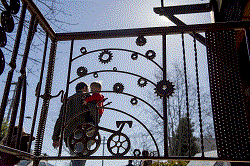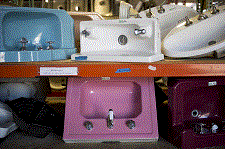 |
|
Communities Talk Trash as They Find
More Extreme Ways to Recycle
When it comes to the mellow mantra "reduce, reuse, recycle," the laid-back West Coast is hard core. Garden-variety plastic bag and bottle bans or now-ubiquitous electronics and pharmaceuticals recycling efforts are old news. In Portlands suburbs, a plan is brewing to craft boutique beer from purified sewage water.
In San Francisco, thirsty residents are being asked to BYOB to a growing network on "hydration stations" where they can fill water bottles. And in Seattle, garbage haulers also serve as compost cops, slapping red tags on bins containing too much compostable materialbanana peels, soggy salads, coffee groundsa scarlet letter for sustainability sinners.

Then there is perhaps the most extreme recycling notion yet: the Urban Death Project. Proposed by Katrina Spade, a Seattle designer and "climate fellow" with the non-profit Echoing Green, it would allow the deceased to go to their eternal rest as compost themselves.
Creative stabs at sustainability pop up regularly across the US, from cigarette-butt recycling bins in New Orleans to a Gilbert, AZ, company that recycles bras. Cities increasingly pick through ways to divert trash from landfills. Since January 1, new restrictions on how Seattleites must sort their trash have led to the issuing of more than 5,200 red tags, warning composting miscreants of the errors of their waste.
The tags, which read, "It's not garbage anymore," are meant to educate, not shame, the city says, and let customers know that fines$1 for each violationwill be assessed beginning this summer. Haulers don't slice bags open, but if they can tell a bag contains more than 10% food waste, they'll tag it.
In the deeply green Emerald City, "We'd had no customer complaints," says Andy Ryan, spokesman for Seattle Public Utilities, "Like Portland," he says, "we're the butt of some national jokes for our green behavior. But our citizens asked for this." He says a survey showed 74% of residents endorsed the requirement to separate food waste from garbage.
Portland, of course, is the locale for TV's "Portlandia," which spoofs the city's image of overly earnest progressiveness. The city's sustainability efforts mirror that perception.

Residents can sign up for eight-week classes to become "master recyclers" by studying thoughtful consumption, alternatives to hazardous household products, green building and more. City-sponsored fix-it fairs teach attendees to repair goods like broken appliances rather than junking them.
Jeanne and Dick Roy, co-directors of Portland's Center for Earth Leadership, have advocated for recycling and reuse efforts here since the 1980s. Mrs. Roy says they never buy anything disposable, such as paper towels, and bring their own containers when ordering takeout.
They compost and recycle so much, she says, that their only trash canwhich they last emptied in March 2014is just half full today. It holds such stuff as dental floss, incandescent light bulbs and non-recyclable plastic, such as the tear strips from frozen-juice cans.
"Reducing consumption and waste," she says, "has been the easiest lifestyle change for me to makea lot easier than living in a smaller house or not driving." Though she notes: "I've made progress in those areas as well."
Clean Water Services, a suburban utility, recently announced a challenge to home brewers to craft ales or lagers from highly purified sewer water, creating "sewage brewage" or "poo brew," as some termed it. The water meets federal safe drinking standards, but its use for brewing still requires state approval before the contest can proceed.
Ted Assur of Portland's Oregon Brew Crew home-brewing club hopes to try. He says he finds the challenge "fun and cool" but would also like to make a point: "As water becomes more difficult to obtain globally," he asks, "how do we break down some of the taboos about where it comes from?"

San Francisco is the city to which many sustainability enthusiasts bow down. Among other practices, officials have banned the sale or distribution on city property of most single-serving bottled water, erecting instead "hydration stations," taps where people can fill their own containers from the city's water supply.
Its efforts at recycling and composting, along with its ban of retailers offering plastic bags, have helped San Francisco divert 80% of its trash from landfills, the city says. It aims for a 100% goal by 2020.
Seattle says it diverts about 55%, while Portland says it diverts about 70%. New York City, by contrast, diverts about 15%, a city spokeswoman says. The national average, according to the EPA, is 34%.
Todd Myers, environment director for the Washington Policy Center, a Seattle think tank, says there are better ideas than the city's new composting program. He says cities such as his would get more for their money and do better things for the environment by, for instance, investing in renewable power instead of mandating composting.
"The reason you get silly policies," he says, "is that symbolic gestures are easier than effective gestures.
Purified wastewater is already on tap in some places. Southern California's Orange County in 2007 opened what was believed to be the world's largest plant devoted to transforming sewage into drinking water. Each day, it produces about 100 million gallons of potable water than flows to residents' faucets, according to the county's water district.
Art Larrange, who runs a Portland brewery, says he proposed the beer-making contest to get people thinking creatively about all sources of water. "We're just borrowing it." he says of the water supply, "kind of like our time on Earth."
Muldoon, Katy, Communities Talk Trash as They Find More Extreme Ways
to Recycle, The Wall Street Journal, March 12, 2015
To learn more about GHA and how your property can be greener, jump to Green Hotels Association!
or CALL 713/789-8889 TODAY!
|
|

GREEN IDEA!
 San Francisco has banned the sale or distribution on city property of most single-serving bottled water, erecting instead "hydration stations," taps where people can fill their own containers.
San Francisco has banned the sale or distribution on city property of most single-serving bottled water, erecting instead "hydration stations," taps where people can fill their own containers.







|
 |


